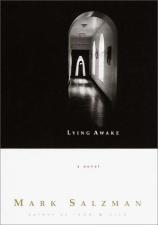Lying Awake
Review
Lying Awake
A lot of people
have told me that they read Mark Salzman's latest novel, LYING
AWAKE, in a single sitting. (I have to confess to needing three.)
Normally, I'm suspicious of such claims --- so often the stuff of
promotional hyperbole --- and yet, in this case, they are telling:
At a breezy 181 pages, LYING AWAKE reads like a single thought
obsessively reworked: Does God exist? If so, how might we get to
know him? Is it possible to live a life of faith and still have
doubts?
Such thoughts run through the mind of Sister John, a middle-aged
nun cloistered in a Carmelite monastery in the heart of present day
Los Angeles. After languishing for years in a spiritual limbo, "her
prayers empty and her soul dry," Sister John suddenly begins to
experience overwhelming visions, dazzling sensations of warmth and
light that she interprets as a direct encounter with God. After
these episodes, Sister John pours her feelings onto paper,
producing ecstatic --- and highly popular --- verse.
The problem is that Sister John's visions are accompanied by
increasingly severe headaches. After blacking out during prayer,
the other nuns decide that Sister John must seek medical help. A
brain scan reveals a small tumor on Sister John's temporal lobe, a
condition known to trigger epileptic seizures, which is often
accompanied by intense psychological experiences and hypergraphia
(voluminous writing). Dostoyevsky is believed to have suffered from
the same condition; so, apparently, did St. Teresa of Avila,
founder of the Carmelite Order. Now, Sister John must face the
possibility that her spirituality has been a sham, her mystical
visions only epileptic seizures. Should she go ahead with surgery
and risk losing her gifts, or should she cling to her possibly
delusional state of grace?
It's a fascinating conflict, even though almost entirely internal.
By interweaving Sister John's thoughts and fears with fragments of
her poetry and prayer, Salzman creates a luminous narrative that
reads like a mind arguing with itself. To his credit, Salzman
resists turning Sister John's dilemma into high drama --- she never
gnashes her teeth in anguish, or throws up her arms in despair.
Instead, he beautifully transmits the rhythms of a contemplative
life --- the daily rituals, the silence and severity, the sisters'
petty squabbles and moments of levity --- and against this backdrop
raises the piercing specter of doubt.
The novel is affecting, austere, and maddening --- so much so that
I continue to think about it days after putting it down. Other
reviewers have noted its lack of pretensions, how it creates beauty
and meaning from a "limited palette." This is undeniably true, but
the simplicity of the writing at times seems threadbare, the
metaphors those that were closest to hand. (Two nuns enduring a
night vigil together become "two life rafts lashed together on the
sea;" the prioress's eyes are "the same color as the sky."
Ý
As a modern fable, Sister John's story raises existential
questions, not just about faith but also vocation, about the
nagging question of just what it is we are meant to do with our
lives. In a recent New Yorker article, Salzman spoke about the life
of a writer as being one of faith --- faith that the novel will get
written, faith that the sacrifices are worthwhile, and most of all,
faith that there is value in art. It took Salzman six years to
write LYING AWAKE. After eliminating a romantic subplot between
Sister John and her doctor ("a cross between the movie Witness and
the movie Awakenings," he jokes), Salzman struggled for years to
put one sentence after another. Only by retreating to a New England
cabin, a place nearly as quiet and solitary as a nun's cell, was he
able to finish the book. "...the book wrote itself in five weeks,
with me in a state that I can only describe as euphoric."
Hallelujah!
The story of how the novel got written is nearly as appealing as
the story of the novel itself, and perhaps that's why I remain
skeptical of its achievements. It's clearly a powerful story, an
opportunity for reflection, and good dinner party fodder. Is it
great literature? You decide.
Reviewed by Martha Hostetter on January 24, 2011
Lying Awake
- Publication Date: September 24, 2000
- Genres: Fiction, Literary Fiction
- Hardcover: 181 pages
- Publisher: Alfred A. Knopf
- ISBN-10: 0375406328
- ISBN-13: 9780375406324




